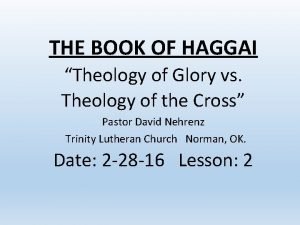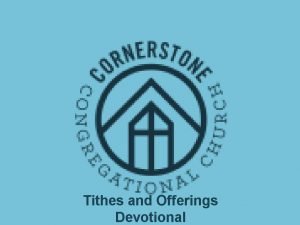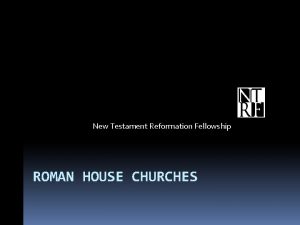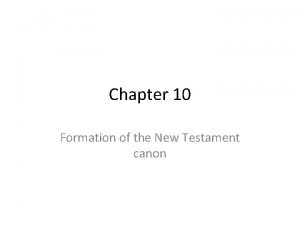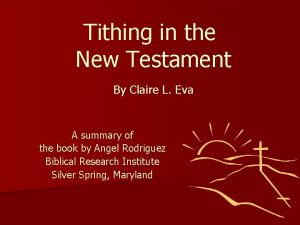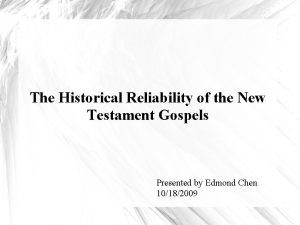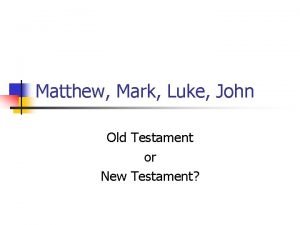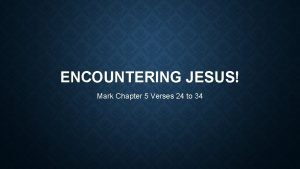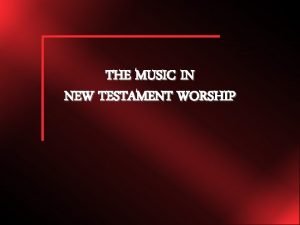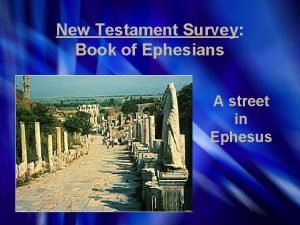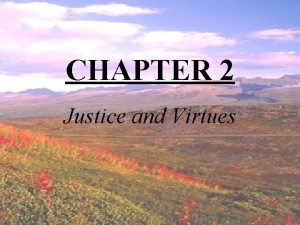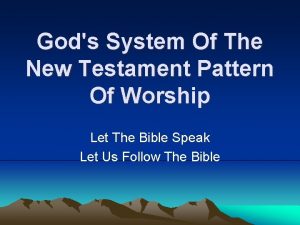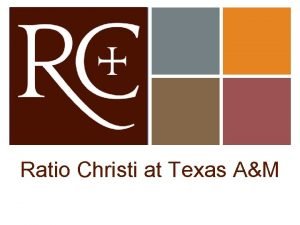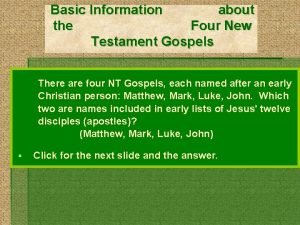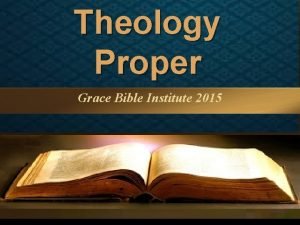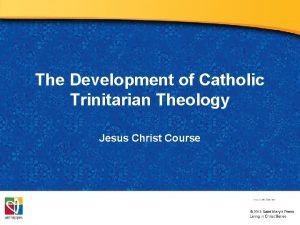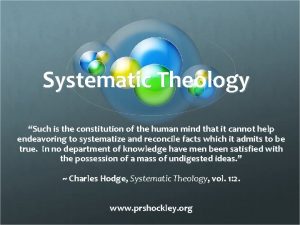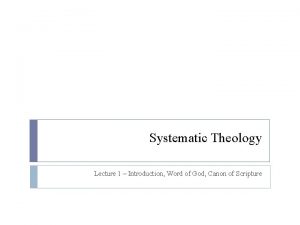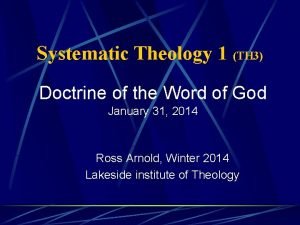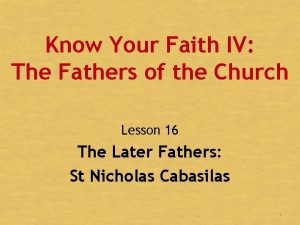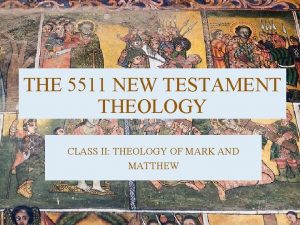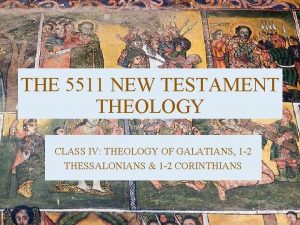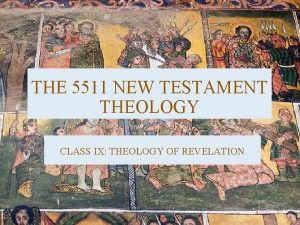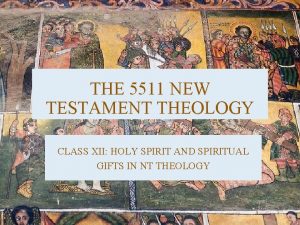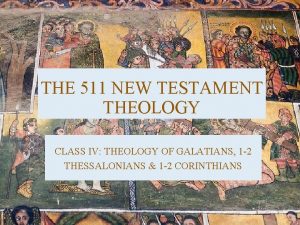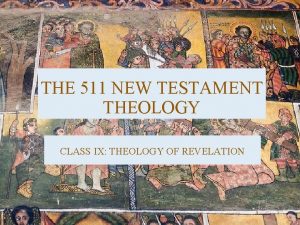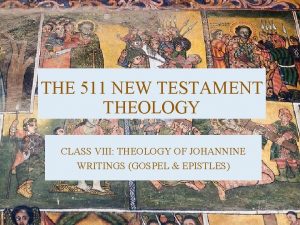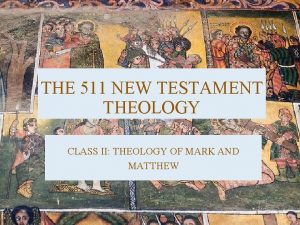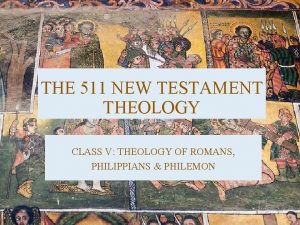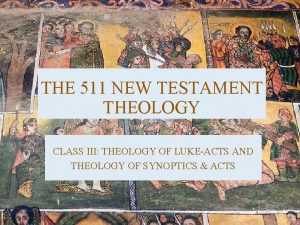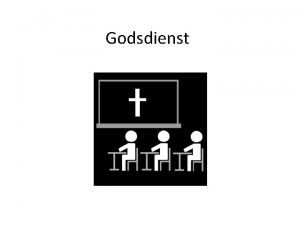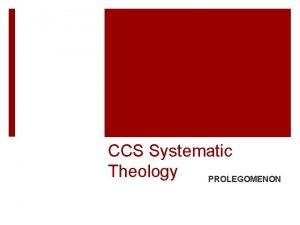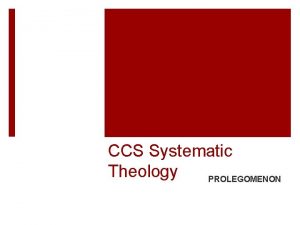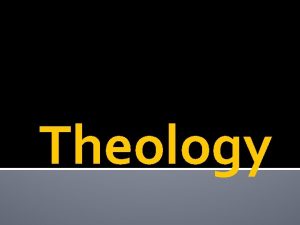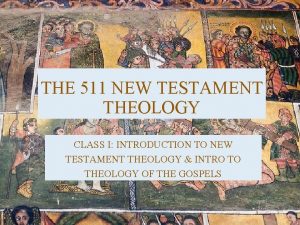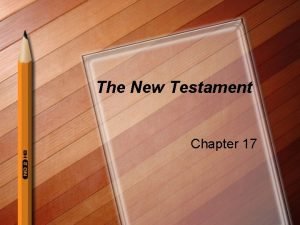THE 5511 NEW TESTAMENT THEOLOGY CLASS V THEOLOGY






![THEOLOGY OF ROMANS, PHILIPPIANS & PHILEMON • “The righteousness of God” [δικαιοσύνη…θεοῦ] (1: 17; THEOLOGY OF ROMANS, PHILIPPIANS & PHILEMON • “The righteousness of God” [δικαιοσύνη…θεοῦ] (1: 17;](https://slidetodoc.com/presentation_image_h2/e5923434e8b17ea697520ba96113cf13/image-7.jpg)











![THEOLOGY OF ROMANS, PHILIPPIANS & PHILEMON • “Arminian exegesis” (Marshall [2004] & Witherington* [2006, THEOLOGY OF ROMANS, PHILIPPIANS & PHILEMON • “Arminian exegesis” (Marshall [2004] & Witherington* [2006,](https://slidetodoc.com/presentation_image_h2/e5923434e8b17ea697520ba96113cf13/image-19.jpg)












- Slides: 31

THE 5511 NEW TESTAMENT THEOLOGY CLASS V: THEOLOGY OF ROMANS, PHILIPPIANS & PHILEMON

THEOLOGY OF ROMANS, PHILIPPIANS & PHILEMON 1. 1 Introduction to theology of Romans • Epistle of Romans in history • Augustine (AD 386) – Tolle, lege! (13: 13 -14) • M. Luther (1515) & Rom 1: 17 • J. Wesley (1738) – “my heart was strangely warmed” • K. Barth (1919) – “Bombshell on theologians’ playground” • Theological issues in Romans • • • Justification by faith Presdestination and election Life in the Spirit & sanctification Israel and the people of God New perspective on Paul

THEOLOGY OF ROMANS, PHILIPPIANS & PHILEMON 2. 1 Theology of Romans • Background & situation briefly • Written from Corinth/Cenchreae between AD 56 -58 • During 3 rd missionary journey (Acts 20: 2 -3) • Prior to last visit to Jerusalem (16: 23; Acts 19: 29; 20: 4; 1 Cor 1: 14) • Most complete presentation of Paul’s theology • Not systematic theology – missing many important themes* • Paul’s personal goals in writing • Relationship building with Roman church (1: 13; 15: 24) • Clarification of his theology (cf. 3: 8; 6: 1) • Travel plans – relief funds to Jerusalem (15: 25 -29)

THEOLOGY OF ROMANS, PHILIPPIANS & PHILEMON • Paul’s pastoral goals • Harmony among the “strong” and the “weak” (14: 1 -23) • Jew and gentile harmony • Possible historical background for conflict • Expulsion of Jews from Rome in AD 49 (Acts 18: 2) • Disturbances over Chrestus (Suet. Life of Claud. 25) • Leadership of house churches to gentiles • Return of Jewish-Christians after death of Claudius • • Jewish-Christian gentile-Christian rift over Jewish heritage Place of Law and good works & Jewish persecution

THEOLOGY OF ROMANS, PHILIPPIANS & PHILEMON • The Gospel of God (1: 1 -6, 16 -17) • Gospel about God (obj. gen. ) OR God’s own Gospel (sub. gen. ) • Gospel of His Son/Christ (1: 9; 15: 19) God’s Gospel about Christ Jesus • Also “my Gospel” (2: 16; 16: 25) God’s calling of Paul to apostolic ministry • Paul’s apostolic ministry & the gospel – worship/cultic language • • Worship (latreuo) by preaching the gospel (1: 9) Minister (leitourgon) in priestly service (hierourgounta) w/ offering (prosphora) sanctified by Spirit (15: 16)

THEOLOGY OF ROMANS, PHILIPPIANS & PHILEMON • Gospel is… • Not Paul’s own message but God’s (1: 1 -6) • In continuity w/ Scripture and its fulfillment (1: 1 -6) • Jesus as descendant of David, Son of God (1: 1 -6) • Victorious & powerful to save & redeem (1: 4 -6, 16; 8: 31 -39) • Word, deed, power, sings & wonders, Holy Spirit & gospel (15: 19) • First to Jews then to gentiles (1: 16; 9 -11) • Reveals God’s righteousness (1: 16 -17) • Appropriated by faith – “from faith to faith” (1: 17)
![THEOLOGY OF ROMANS PHILIPPIANS PHILEMON The righteousness of God δικαιοσύνηθεοῦ 1 17 THEOLOGY OF ROMANS, PHILIPPIANS & PHILEMON • “The righteousness of God” [δικαιοσύνη…θεοῦ] (1: 17;](https://slidetodoc.com/presentation_image_h2/e5923434e8b17ea697520ba96113cf13/image-7.jpg)
THEOLOGY OF ROMANS, PHILIPPIANS & PHILEMON • “The righteousness of God” [δικαιοσύνη…θεοῦ] (1: 17; 3: 5, 21 -22, 25 -26; 10: 3; 2 Cor 5: 21) • What does “righteousness” mean? Being in the right relationship w/ God 1) Righteousness that God grants (obj. gen; cf. 2 Cor 5: 21; Phil 3: 9) • Often “righteous status” that God grants [or imputed righteousness] 2) God’s own righteousness [character] (sub. gen. ; Rom 3: 5, 26; 10: 3) 3) God’s righteousness as saving activity (3: 21 -22) • • Based on God’s faithfulness to covenant God’s righteousness/covenant faithfulness in light of human sin Manifested to humans as He acquits the guilty

THEOLOGY OF ROMANS, PHILIPPIANS & PHILEMON • Human predicament – people in need of salvation • Righteousness of God revealed – wrath of God… (1: 17 -) • Wrath of God…from heaven – just & impartial response to sin • • • Refusal to acknowledge God (1: 18 -23; cf. Wisd 13: 1 -14: 31) Idolatry, downward spiral & consequences (1: 24 -32) Jews guilty despite having the Law (2: 3, 11, 13) • • Gentiles have “law in their heart” – also guilty (2: 13 -15) Judgment: eschatological & present predicament (2: 5, 16; 1: 18 -32) Sin reveals judgment – humans cannot free themselves

THEOLOGY OF ROMANS, PHILIPPIANS & PHILEMON • Judgment based on “deeds” • • Payment “according to deeds” (2: 6 -11; cf. Matt 16: 27) “doers of the Law” justified (2: 13) Is Paul contradicting his later “law-free” gospel? (cf. 3: 23) • Towards solution(s) 1) Rhetorical & theological argument (1: 18 -3: 20) • “sweeps reader off their feet” & power of sin – powerlessness of Law 2) (Purely) a hypothetical situation – no-one fulfills all the Law 3) Description of the humanity without Christ • What was formerly impossible is now possible through Christ and the Spirit “righteous requirements of Law might be fulfilled in us” (8: 4) Argument culminating in “no-one righteous…all under power of sin”

THEOLOGY OF ROMANS, PHILIPPIANS & PHILEMON • The Origin of Sin – Adam; salvation in Christ (5: 12 -21) • Adam’s sin – disobedience, condemnation, death One man, one sin, death’s dominion, and condemnation all • Christ’s gift – free gift, grace, justification, (eternal) life • The cosmic power of sin (7: 7 -22) – “Law is holy, just, good” (7: 12) • Inability to resist sin and be free (7: 14 -25) • Law is spiritual (pneumatikos) – people carnal/fleshly (sarkinos) (7: 14) • Who is speaking? Paul OR rhetorical device of impersonation* • • • Paul – before his conversion Paul – his present experience Non-Christians in general With Spirit Without Spirit Individual OR Collective Compare Rom 7: 14, 17 -18 – 6: 22, 2, 14, 13, 19 Humanity in Adam in general – “I” of everyone under the power of sin**

THEOLOGY OF ROMANS, PHILIPPIANS & PHILEMON “Righteousness” as ethical behavior in Paul (Rom 6: 13, 16, 18 -20; Eph 4: 24; 5: 9; • Salvation & righteousness of God Phil 1: 11; 1 Tim 6: 11; 2 Tim 2: 22) • The “how” of redemption – apart from God: sin, death, wrath • Righteousness of God revealed…power of salvation (1: 17) God’s way of dealing with sin • Humanity cannot save itself – salvation attested by Scripture (3: 21) • God’s righteousness demonstrated through Christ’s death • God justifies freely (3: 24) – eschatological verdict announced in advance • • “…justified by blood…will be saved from wrath” (5: 9) God acquits the guilty because… (forensic sense most clearly in 8: 33) • • Through redemption (3: 24 -25) – ransom from the power of sin Blood of Jesus covers/expiates (OR propitiates*) sin (3: 25) Christ as the (new) mercy seat (hilasterion) (cf. Lev 16: 14 -16)

THEOLOGY OF ROMANS, PHILIPPIANS & PHILEMON • Earlier God “passed over” sin (Gk. διὰ τὴν πάρεσιν*; 3: 25) • God “overlooked” the past sin OR • God brought about forgiveness of sins committed in the past • Apart from the “works of the Law” – the meaning 1) Good works and piety • Failure to do good works (3: 20; 3: 27; 4: 2) • Election apart from good works (9: 11 -12) 2) Jewish boundary markers (circumcision, diet, Sabbath, calendar) • Circumcision (2: 25 -29; 3: 1, 30; 4: 9; 15: 8) • Diet and calendar (Rom 14) Both ideas present in Romans – no: 1 includes no: 2

THEOLOGY OF ROMANS, PHILIPPIANS & PHILEMON • By faith…apart from the works of the Law • Gospel-salvation appropriated by faith (1: 16; 3: 25; 10: 4, 9) • “faith to faith” (1: 17; ἐκ πίστεως εἰς πίστιν) 1) From first to last (completely)/faith alone 2) Believing in the “faith” (=doctrine) 3) From the faithful one (God/Jesus) unto those who have faith* • Abraham’s trust in God’s promises (4: 17 -18) • “obedience of faith” (1: 5) – apposition or genitive of origins? • • Obedience = faith (app. gen) Obedience that is derived from faith (gen. orig. ) Measure of faith given to each (12: 3, 6; 14: 1, 22 -23) Faith in/of Jesus Christ (pisteos Iesous)** effects justification (3: 25 -26) Matter of utter trust in God who justifies the ungodly (4: 5)

THEOLOGY OF ROMANS, PHILIPPIANS & PHILEMON • Life of the redeemed and justified in the power of HS • From Adam, sin, and death to Christ, righteousness, and life • Peace and reconciliation with God (5: 1, 10) – not wrath & enmity • Access to God and assurance (5: 2, 9 -10) • Union w/ Christ’s death and resurrection – freedom from sin • Died w/ Christ, life in Christ (6: 8 -9) • No longer under the Law but grace (6: 14) • Death to the realm and power of sin in Christ, under grace – not in Adam or under the Law

THEOLOGY OF ROMANS, PHILIPPIANS & PHILEMON • Freedom of the life in the Spirit (8: 1 -30) • Realm of Christ and power of the Spirit – freedom from sin (8: 1 -2) • • • Realm of human weakness and sin (=flesh) overcome (8: 9) Righteous requirement of the Law fulfilled through the Spirit (8: 4) Assurance – to please God now & future resurrection (8: 9 -11) Spirit assures of sonship & inheritance (8: 15 -17) Spirit as the “first fruit” of the full glorification (8: 23, 29) Glorification of the justified (8: 29 -30) Does this mean God predestined some while not others?

THEOLOGY OF ROMANS, PHILIPPIANS & PHILEMON • God’s sovereignty (in salvation) • Bound by sin – destined to condemnation & death w/o Christ Faith in Christ saves and justifies sinners – Spirit set free • God’s foreknowledge, predestination, and salvation (8: 28 -30) • Foreknew…predestined…called…justified…glorified 1) Augustinian-Calvinistic view --- divine predestination of the elect 2) Arminian view --- salvation per divine foreknowledge by response Both view need to import foreign philosophical concepts

THEOLOGY OF ROMANS, PHILIPPIANS & PHILEMON 28 And we know that God causes all things to work together for good to those who love God [συνεργεῖ εἰς ἀγαθόν], to those who are called according to His purpose. 29 For those whom He foreknew [οὓς προέγνω; cf. 11: 2], He also predestined [προώρισεν συμμόρφους τῆς εἰκόνος τοῦ υἱοῦ αὐτου] to become conformed to the image of His Son, so that He would be the firstborn among many brethren; 30 and these whom He predestined [προώρισεν], He also called [ἐκάλεσεν]; and these whom He called, He also justified [ἐδικαίωσεν]; and these whom He justified, He also glorified [ἐδόξασεν]. (Rom 8: 28 -30) Who “chooses” salvation? God or human being? Or both?

THEOLOGY OF ROMANS, PHILIPPIANS & PHILEMON • “Calvinistic exegesis” (e. g. T. Schreiner [2001, 2008]) • Foreknew…predestined…called…justified…glorified • Chain of events inevitable reality for God & God’s people • Nothing can break the chain – foreknown, predestined glorified • Certainty of the future event expressed in the past aorist tense • God’s “foreknowledge” – decision based on love • Sprit’s intercession and Christ’s love are “unbreakable” (8: 35 -37) • God’s sovereignty & election “overrides” any human “willing” (9: 16) • • Jacob-Esau (promise-flesh; 9: 6 -14) God’s mercy and hardening (9: 15 -18) Potter and the clay (9: 19 -24) Israel and gentiles (9: 25 -33) Election and God’s sovereignty exalted and emphasized
![THEOLOGY OF ROMANS PHILIPPIANS PHILEMON Arminian exegesis Marshall 2004 Witherington 2006 THEOLOGY OF ROMANS, PHILIPPIANS & PHILEMON • “Arminian exegesis” (Marshall [2004] & Witherington* [2006,](https://slidetodoc.com/presentation_image_h2/e5923434e8b17ea697520ba96113cf13/image-19.jpg)
THEOLOGY OF ROMANS, PHILIPPIANS & PHILEMON • “Arminian exegesis” (Marshall [2004] & Witherington* [2006, 2009]) • Death of Christ has universal scope (5: 18; 11: 32) • God is free to do as pleases but God’s mercy not arbitrary (cf. 9: 15) • Language of predestination indicates corporate election & “pre-destiny” • Foreknowledge [1 st in the chain] cannot mean predestination • • God’s “pre-destiny” to those who have come to faith – “image of Christ” “elect” – those who are believers; not unbelievers to be selected (8: 33) God’s purpose of creating a people not to save some select individuals • • • “God…not rejected His people [physical Israel] whom He foreknew. ” (11: 2)** Potter-clay about gentiles & Israel – God’s mercy cannot be explained Paul’s prayer for Israel & disappointment w/ obstinate people (10: 1, 21) Persistence in unbelief and danger of being “cut off” (11: 21 -23) Mystery of divine election, predestination, and human response (cf. Jer 18)

THEOLOGY OF ROMANS, PHILIPPIANS & PHILEMON • God’s faithfulness toward Israel (Rom 9 -11) • God’s faithfulness to Israel – Who failed? God’s word? (9: 6) • True Israel based on promise & election [“in Christ”] not physical descent • Abraham’s descendants: Isaac (Ishmael) – Jacob (Esau) (9: 7) • Isaac/Jacob [Ishmael/Esau] as “representative heads” of collective groups • One represents “true Israel” [remnant/promise] other “physical Israel” • God’s election based on His mercy not physical descend (9: 16) • Is God unjust? God’s freedom in showing mercy (9: 16 -33)* • • God’s choice of Isaac & Jacob demonstrates God’s mercy Pharaoh represents Israel – both Pharaoh** & Israel [unbelieving] first hardened themselves after which God hardened them

THEOLOGY OF ROMANS, PHILIPPIANS & PHILEMON • Why does God “find fault” [i. e. judge]? (9: 19) • • • Lump of clay: two destinies (mercy [believing]/wrath [unbelieving Israel]) “objects of mercy” – those called from Israel and gentiles (“us”; 9: 24) Israel heard the gospel and rejected (10: 3 -21) Righteous by faith [from gentiles and Jews] (9: 30 -10: 21) • Has God rejected Israel then? (11: 1 -36) • • • Partial hardening of Israel leads to “salvation of gentiles” (11: 2 -11) Olive tree [collective metaphor] into which gentiles are grafted (11: 17 -24) Jewish remnant/elect who now believe – by grace (11: 2 -7, 20 -23) Israel’s condition is not permanent – “if…don’t continue in unbelief” (11: 23 -24) “all Israel saved” (11: 26 -29)* - end-time or anytime event? Israel’s future role politically not clarified except “the gifts and the calling of God are irrevocable” (11: 29)

THEOLOGY OF ROMANS, PHILIPPIANS & PHILEMON • Moral life of believers • Ethical dilemma of the Law-free gospel • What then? Should we sin because we are not under law but under grace (6: 15, 1; 3: 7 -8, 20; 5: 20) • Relationship between indicative and imperative • • Indicative = what God has accomplished in Christ Imperative = believer’s duty to obey Already Not-yet • Moral life and obedience based on Christ’ death & life in the Spirit • • • Obedience required and made possible From Adam to Christ; flesh-Spirit; death/sin-life; Law-grace New life in Christ (6: 1 -23)

THEOLOGY OF ROMANS, PHILIPPIANS & PHILEMON • Life in the Spirit (8: 1 -30) – moral life as worship and spirituality • “living sacrifice” “spiritual/logical worship” [logiken laterian] (12: 1 -2) • Practicalities of the moral life – instructions and exhortations • • “consider yourself dead to sin” “Do not let sin exercise dominion”; “present yourselves to God” (6: 1 -23) - Imperative - Obligation - Not-yet Walk in Spirit “set your minds” “Spirit gives life” “leading”- “sonship” Not Imperfect flesh – “put to death” “cannot submit” “slavery” “death” (8: 10 -13) Law summarized in love (13: 8 -10) & fulfilled by the Spirit (8: 4) Communal worship – wellbeing of the body b/f individual & life in the - Indicative - “In Christ” society (12: 1 -15: 13) - Already - Divine power “already and not-yet” tension of the moral transformation (cf. 8: 18 -25)

THEOLOGY OF ROMANS, PHILIPPIANS & PHILEMON 2. 2 Theology of Philippians • Background & situation • Written from Rome (or Caesarea/Ephesus) • Paul in prison & church suffered persecution (1: 7, 13 -14, 17, 29) • Strong personal tone and close friendship w/ congregation • Partnership in the gospel and problem areas in Philippi • Prayers and financial support (1: 5, 19; 4: 10 -20) • Disunity (4: 2 -9) • Incipient Judaizing tendencies (3: 1 -4: 1)

THEOLOGY OF ROMANS, PHILIPPIANS & PHILEMON • Paul’s life as a pattern for behavior • Philippians – imitate Christ & imitate Paul • Imitation of Paul as a model in “heavenly citizenship” (1: 27 -30; 3: 20) • Persecution (1: 12 -30); threat of Judaizers (3: 1 -2); circumstances (4: 1 -20) • Prison and persecution “the same struggle that you saw I had” (1: 30) • • • False preachers (1: 15 -17) Threat of death: “living is Christ” “death gain” (1: 21 -23) Imprisonment & the spread of the gospel (1: 12 -14, 18) Paradoxical nature of Christ’s suffering & Paul’s hardships

THEOLOGY OF ROMANS, PHILIPPIANS & PHILEMON • Gains & losses for the gospel “join me in imitating me” (3: 17) • False teachers: righteousness based on the Law (3: 1 -3) • • • Paul’s example – righteousness from God – former gains as loss Seek to experience power of resurrection and share in suffering (3: 10) Expectation of glorious body and earthly life as heavenly citizen (3: 20 -1) • Trying circumstances & disunity (4: 9) “Keep on doing…[what] you…learned and received and heard and seen in me” • Paul urges unity (4: 2 -9) • Paul’s trying circumstances overcome by Christ (4: 10 -14) • “all things through Christ” (4: 10) How to live in difficult & changing circumstances through Christ

THEOLOGY OF ROMANS, PHILIPPIANS & PHILEMON • Christology (2: 5 -11) • Structure of Phil 2: 5 -11* • Self-emptying of divine Christ (2: 5 -8) • Attitude of Christ -- • In the form [morphe**] of God – equality w/ God not exploited • Self-emptying I -- • Emptied himself [heauton ekenosen] – form of slave [morphe**] – in human likeness • Self-emptying II -- • Humbled himself – obedient to death – death on the cross

THEOLOGY OF ROMANS, PHILIPPIANS & PHILEMON • Exaltation of Jesus (2: 9 -11) • God exalted – name above other names • Universal worship • Name Jesus – every knee shall bow in heaven, earth, under the earth • Universal confession • Every tongue confess – Jesus as Lord [kyrios] – to glorify Father

THEOLOGY OF ROMANS, PHILIPPIANS & PHILEMON • Jesus possessed equality w/ God (in very nature) from the very beginning – but did not take advantage/claim [harpagon] of that • Jesus’ morphe is same as God the Father • Jesus self-emptied and took the very nature of human being – death on the cross – God exalted Jesus and restored the divine prerogatives to Jesus • • Jesus is distinct from God the Father as “sent one” & “exalted one” Fullness of human condition to serve others Status of universal lordship, the new dimension Divine status yet distinction between God the Father & Lord-Son Jesus “Let your mind be that of Christ Jesus” (2: 5)* Attitude of Christ’s self-emptying as a pattern for the community

THEOLOGY OF ROMANS, PHILIPPIANS & PHILEMON 2. 3 Theology of Philemon • Situation – app. 60 AD from Rome • To Philemon – owner of slave Onessimus • Onesimus had harmed Philemon and escaped (12, 17 -19) • Meets Paul, believes in Christ (10) • Paul appeals on his behalf (12 -17) • “receive him no longer as a slave…but as dear brother” (16) Radical reorientation of human relations in light of New Creation Theology of New Creation presupposed

THEOLOGY OF ROMANS, PHILIPPIANS & PHILEMON • Paul
 Book of haggai
Book of haggai New creation theology
New creation theology Encouragement about giving tithes and offering
Encouragement about giving tithes and offering House churches in the new testament
House churches in the new testament Tithe in new testament
Tithe in new testament Encountering jesus in the new testament answer key
Encountering jesus in the new testament answer key Encountering jesus in the new testament
Encountering jesus in the new testament Greek word canon
Greek word canon Tithing in the new testament
Tithing in the new testament Reliability of new testament
Reliability of new testament Test: the general epistles new testament survey
Test: the general epistles new testament survey New testament reformation fellowship
New testament reformation fellowship Matthew mark luke john old testament
Matthew mark luke john old testament Encountering jesus in the new testament
Encountering jesus in the new testament Is titus in the old or new testament
Is titus in the old or new testament Music in the new testament
Music in the new testament New testament survey book
New testament survey book Justice and virtue
Justice and virtue 27 new testament books
27 new testament books New testament pattern of worship
New testament pattern of worship New testament canon
New testament canon Flesh and bone
Flesh and bone Choose life new testament
Choose life new testament Four new testament gospels
Four new testament gospels Define theology proper
Define theology proper Theology proper definition
Theology proper definition Antony flew theology and falsification
Antony flew theology and falsification The development of catholic trinitarian theology
The development of catholic trinitarian theology Define systematic theology
Define systematic theology Theology proper lecture notes
Theology proper lecture notes What is theology
What is theology Palamite theology
Palamite theology
